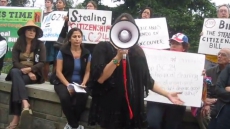TORONTO — The cost to Quebec taxpayers for a single baby born to a woman aged 40 and older ranges from almost $45,000 to more than $100,000 under the province's publicly funded IVF program, a study has found.
And while no live births were recorded for women age 44, the mean cost of failed in-vitro fertilization among this age group hit almost $600,000.
Those findings, say researchers, represent a cautionary tale for any other jurisdiction considering whether to fund a similar program.
In 2010, Quebec became the first jurisdiction in North America to cover the costs of IVF for couples unable to conceive on their own. The program funds three cycles of the procedure — stimulating ovulation, egg retrieval and embryo transfer — that results in a live birth.
The actual cost is higher: the program does not reimburse patients for medications needed for IVF, which typically run between $3,000 and $5,000 per cycle and are often paid for by private insurance.
In all, 246 babies were born to women 40-plus during the 2010-2012 study period, said lead researcher Dr. Neal Mahutte, medical director of the Montreal Fertility Centre.
Researchers found that each live birth achieved through IVF for women aged 40, and using their own eggs, cost the government $43,153, a figure that increased exponentially with age, reaching almost $104,000 for 43-year-olds.
In contrast, IVF treatment that resulted in a live newborn for women under age 35 averaged $17,919, say the researchers, whose study will be presented Monday at the American Society for Reproductive Medicine (ASRM) annual meeting in Baltimore.
Because the Quebec government didn't put an upper age limit on its program, older women whose prognosis for conception even with IVF continues to diminish with each birthday are also eligible for funding.
"So you had an awful lot of patients in Quebec who actually underwent more than three egg retrievals, and particularly in your 42-year-old and older patients, where they have high cycle-cancellation rates, they can have high rates of having a retrieval but no egg, or an egg that doesn't fertilize or nothing to transfer," Mahutte said.
"You had patients who would repetitively cycle because they had basically everything to gain and nothing to lose by trying again."
Mahutte said there's a clear relationship between the live birth rate per IVF cycle start and a woman's age.
"And because the live birth rate per cycle start goes down quite substantially at age 40 and above, funding those cycles comes at a very substantial financial cost to the public," he told a media telebriefing.
"So our conclusion was that any government that's planning to introduce public funding should be aware of this relationship and should at least consider age eligibility criteria in order to maximize return on their investment."
Ontario recently announced it will begin funding one cycle of IVF to achieve egg retrieval and one-at-a-time transfer of all viable embryos to allow for the possibility of multiple chances for pregnancy. Women age 42 and under are eligible for coverage, which begins in December.
Meanwhile, the Quebec government is poised to overhaul its program under Bill 20, which would remove most IVF coverage from the provinces's health coverage.

Bill 20 would cap the eligibility for IVF at age 42. Women older than that would have to pay for the assisted reproduction procedure out of their own pockets.
Under the proposed legislation, women who qualify for IVF would be offered tax credits based on family income. Those with an annual family income of less than $50,000 would receive an 80 per cent tax credit to cover the cost of treatment, while those with higher earnings could receive a credit as low as 20 per cent.
While clearly expensive for Quebec's public purse — IVF coverage was initially budgeted at $30 million a year, but had hit $70 million by 2013 — it did manage to achieve one of its major goals.
In part, the program was aimed at reducing the number of multiple-fetus pregnancies from transferring more than one embryo at a time in the hope of producing a singleton birth.
That's because twin, triplet and other multiple pregnancies often result in premature and underdeveloped newborns whose fragile health can be costly for the already overburdened health system — initially for neonatal intensive care and sometimes due to lifelong medical conditions.
A second study to be presented Monday at the ASRM meeting found Quebec's IVF program met its goal of reducing the multiple birth rate to less than 10 per cent of all IVF deliveries — down from 25 per cent before the program began.
"The first incomplete year of the program, it goes down to 13.1 per cent, then it goes down to 9.5 per cent the first full year of the program," said lead researcher Dr. Michael Dahan, a fertility specialist at McGill University's Reproductive Centre.
Provincial health records show there were just over 1,000 IVF babies born per year before public funding, a number that jumped by 64 per cent to 1,723 in the first full year of the program, while births from spontaneous conceptions continued to hover around 84,000 each year.
Pre-program, there were 218 multiple births resulting from IVF treatment in the year coverage was instituted; that figure fell by 60 per cent to 165 in the first year after, said Dahan.
"Even though more IVF is being done and more babies are being born, the number of multiple births is going down."
Yet despite that drop, the study found the proportion of women admitted to hospital after becoming pregnant through IVF rose each year after the program's introduction.
"We thought because the multiple pregnancy rate dropped so substantially that we would see a decreased rate in the antepartum (pre-delivery) admission. In fact, we did not," said Dahan. "It was a little surprising and we have a little trouble explaining it."
Researchers say the publicly funded IVF program has had another positive effect — raising the province's live birth rate by almost 0.8 per cent — "a very significant increase," said Dahan.
Quebec's fertility rate in 2011 was close to the national average of 1.61 children per woman, according to the most recent figures from Statistics Canada, but fell below the two children needed to maintain population levels without immigration.




